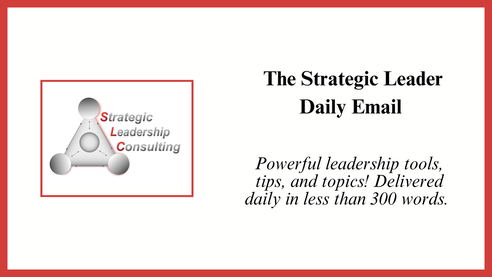|
Colleagues,
Tuesday, we looked at what constitutes a win and yesterday I suggested replacing your to-do list with a win list consisting of one or two priorities. After writing that message, I read Seth Godin’s post on jobs to be done. Seth noted, “Easily overlooked, though, is the process of how something gets on our agenda or doesn’t.” This made me think. We’ve been talking about priorities on the list, but how do we decide what goes onto the list in the first place? On a daily basis, at least one of the items on your win list should:
So, reflect on your week:
Do good and be well, Frederick
0 Comments
Colleagues,
Happy Tax Day! Oh wait, that’s in May this year. I can hardly wait =;^} Yesterday I tried to convince you to get rid of your to-do list. Of course, it isn’t as simple as that as we still need to have something to help focus us. While I usually strive for simplicity, in this case I suggest replacing the daily to-do list with two lists:
Do good and be well, Frederick Colleagues,
First, I must confess to being a hypocrite. In today’s message we are going to play with the idea of abandoning your to-do list – and today I wrote out a to-do list. I just can’t help myself because I’ve been so conditioned to making that list and using it to focus my day. Many of us use the to-do list to focus our work for the day. If we have identified the things that constitute a win and we focus on them first, then the to-do list may work, but more likely we treat all tasks as being equal and we focus on the simplest or most urgent, not the most important. Also, the list creates false expectations, which lead to disappointments on a daily basis. At the end of the day, we are likely to regret all the things we did not get done instead of reflecting on all the things we did get done. Take a few minutes to reflect on your to-do list and how it does or does not work for you. Do good and be well, Frederick Colleagues,
Identifying what constitutes a win is a little different than identifying a goal. The goal should be the desired outcome. The win is a satisfactory outcome. I may plant a bunch of lettuces with the goal of having enough lettuce to fix two big salads every day. That’s the goal. However, if I get enough lettuce for one salad each day, that will be a win. Maybe you have 10 things on your to-do list (although you shouldn’t). Chances are that you will not get them all done. You might not get most of them done. So, what one or two things, if you could get them done, would constitute enough? It isn’t ideal, but it is satisfactory. Identifying a win helps us:
While you may not get everything done today, if you get one or two of the important things done, that will be a win. And a win is a good thing. Do good and be well, Frederick Colleagues,
When I say, “I need to find more balance,” you probably know exactly what I mean. When I hear others say this, it usually means that they are spending too much time working or too much time doing a specific type of work. The implication is that if we could work less, then we could be better parents, partners, or friends. The problem is that it isn’t just an issue of quantity (how much time I spend doing x), but also of quality (how well I am doing x). Whether we are talking about work, family, or play, there are a couple powerful things you can do to increase the quality of the time you spend (or invest) in a given area:
I’ll talk more about the win tomorrow. Do good and be well, Frederick |
Categories
All
Archives
April 2024
|


 RSS Feed
RSS Feed